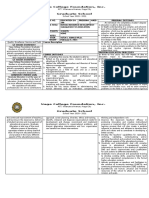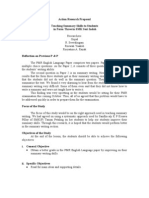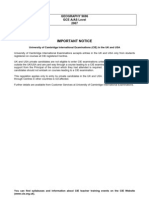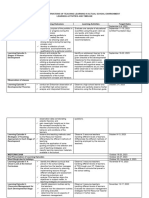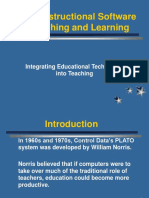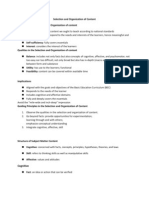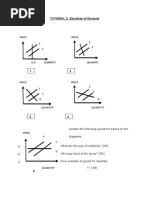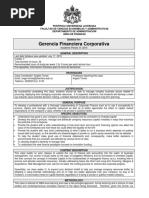ECON1102 Macroeconomics 1 S22017
ECON1102 Macroeconomics 1 S22017
Uploaded by
Ted LuCopyright:
Available Formats
ECON1102 Macroeconomics 1 S22017
ECON1102 Macroeconomics 1 S22017
Uploaded by
Ted LuOriginal Description:
Original Title
Copyright
Available Formats
Share this document
Did you find this document useful?
Is this content inappropriate?
Copyright:
Available Formats
ECON1102 Macroeconomics 1 S22017
ECON1102 Macroeconomics 1 S22017
Uploaded by
Ted LuCopyright:
Available Formats
UNSW Business School
School of Economics
ECON1102
Macroeconomics 1
Course Outline
Semester 2, 2017
Course-Specific Information
The Business School expects that you are familiar with the contents of this
course outline. You must also be familiar with the Course Outlines Policies
webpage which contains key information on:
Program Learning Goals and Outcomes
Academic Integrity and Plagiarism
Student Responsibilities and Conduct
Special Consideration
Student Support and Resources
This webpage can be found on the Business School website:
https://www.business.unsw.edu.au/degrees-courses/course-outlines/policies
business.unsw.edu.au
CRICOS Code 00098G
Table of Contents
1 STAFF CONTACT DETAILS 1
1.1 Communications with staff 1
1.2 Exam Study Period Pitstop 1
2 COURSE DETAILS 2
2.1 Teaching Times and Locations 2
2.2 Units of Credit 2
2.3 Summary of Course 2
2.4 Aims and Relationship to Other Courses 2
2.5 Student Learning Outcomes 3
3 LEARNING AND TEACHING ACTIVITIES 4
3.1 Approach to Learning and Teaching in the Course 4
3.2 Learning Activities and Teaching Strategies 4
4 ASSESSMENT 6
4.0 You must complete the Working with Academic Integrity module on your Moodle
site, before you hand in any written work. 6
4.1 Formal Requirements 6
4.2 Assessment Details 6
4.3 Assessment Format 6
4.3.1 Tutorial Worksheets and MCQ 6
4.3.2 Mid-Session Test 7
4.3.3 Final Exam 7
4.3.4 Protocol for viewing final exam scripts 7
4.4 Quality Assurance 7
5 COURSE EVALUATION AND DEVELOPMENT 7
6 COURSE RESOURCES 8
7 COURSE SCHEDULE 9
7.1 Lecture Schedule 9
7.2 Tutorial Schedule 10
business.unsw.edu.au
CRICOS Code 00098G
1 STAFF CONTACT DETAILS
Lecturer-in-Charge: Glenn Otto
Location: Room 433 UNSW Business School
Phone: 9385 3332
Email: g.otto@unsw.edu.au
Consultation Times: TBC
Lecturer: George Kudrna
Location: E307 in NICTA Bldg (CEPAR, East Wing, Level 3)
Phone: 9385 1446
Email: g.kudrna@unsw.edu.au
Consultation Times: TBC
Lecturer: Arusha Cooray
Location: Room 436, UNSW Business School
Phone: 9385 7019
Email: TBC
Consultation Times: TBC
Course Administrator: Neil Hart
Location: Room 436, UNSW Business School
Phone: 9385 7019
Email: n.hart@unsw.edu.au
Consultation Times: TBC
Tutors: A full list of tutors will be posted on Moodle Staff Contacts.
1.1 Communications with staff
The Lecturer-in-Charge (Glenn Otto) is responsible for the overall direction and
academic content of the course. You can also contact your lecturer about academic
matters. The lecturers in Macroeconomics 1 will hold regular office hours starting Week
2 until Week 13.
Questions about administrative matters on tutorials, such as your allocation to a
tutorial group or your marks during the session should be directed to the Course
Administrator, Neil Hart.
Email is the recommended means of initial communication with the teaching staff for
this course. Academic staff will generally reply to email within 48 hours (except on
weekends). You should use your UNSW email to contact academics and include your
full name and student number in the email.
For detailed discussion of course subject material it may be necessary to attend a
lecturers scheduled office hours.
We encourage you to provide course feedback and comments via email, if you wish.
Please note that academics have no advance notice of the date and time of the exam.
1.2 Exam Study Period Pitstop
In the weeks leading up to exams, starting from about Week 12, the School will be
providing Pitstop, an opportunity for consultation with tutors as you revise for the
1
business.unsw.edu.au
CRICOS Code 00098G
exams. Details of Pitstop locations and hours for this course will be advised closer to
the time.
2 COURSE DETAILS
2.1 Teaching Times and Locations
Lectures
There are 12 weeks of lectures in the course. Lectures begin in Week 1 (24 28 July)
and end in Week 12 (16 20 October).
LECTURE
DAY TIME LOCATION LECTURER
STREAM
A Thursday 9:00 11:00am Science Theatre AC
B Wednesday 12:00 2:00pm Science Theatre GK/GO
C Monday 2:00-4:00pm Science Theatre GK/GO
D Thursday 6:00-8:00pm Ainsworth G03 GK/GO
Tutorials
Tutorials begin in Week 2 (31 July 4 August) and end in Week 13 (23 27 October).
The location of tutorials can be found by viewing your student class timetable by
logging into myUNSW and selecting the relevant week. You must attend the tutorial in
which you have enrolled.
The tutorial program will be available on Moodle.
2.2 Units of Credit
The course is worth 6 units of credit. There is no parallel teaching in this course.
2.3 Summary of Course
Macroeconomics studies the aggregate behaviour of the economy. This course
provides an introduction to the economic analysis of key macroeconomic variables
such as output, employment, inflation, interest rates and exchange rates. The
important elements of the course include; measurement of macroeconomic variables,
the development of models and theories to explain the behaviour of macroeconomic
variables; use of empirical evidence in evaluating different models and the role of
government policy in seeking to influence macroeconomic outcomes.
2.4 Aims and Relationship to Other Courses
Macroeconomics 1 (ECON1102) is offered as part of the first year core in the B.Econ
degree and as an option in the B. Com degree. It is a required course for anyone
2
business.unsw.edu.au
CRICOS Code 00098G
undertaking an economics major. Students are introduced to the study of economics
via Microeconomics 1 (ECON1101) which studies decision making by individuals and
firms and examines the role of governments in seeking to ensure the efficient operation
of markets. Macroeconomics 1 builds on these microeconomic concepts and models to
study economic decisions and outcomes and the role of government in the national and
international economy. A pass in Microeconomics 1 is a prerequisite for enrolment in
Macroeconomics 1. ECON1102 and ECON1101 cannot be taken concurrently. With
the exception of Microeconomics 1, no previous study of economics is assumed.
Macroeconomics 1 is a prerequisite for all upper year macroeconomics courses and
most other upper level economics courses offered by the School of Economics (i.e.
with course codes beginning 2 and 3.) In addition, the concepts, models and
approaches developed in Microeconomics 1 and Macroeconomics 1 provide the
foundation for business studies in accounting, finance, marketing and management.
2.5 Student Learning Outcomes
The Course Learning Outcomes are what you should be able to DO by the end of this
course if you participate fully in learning activities and successfully complete the
assessment items.
The Learning Outcomes in this course also help you to achieve some of the overall
Program Learning Goals and Outcomes for all undergraduate coursework students in
the Business School. Program Learning Goals are what we want you to BE or HAVE
by the time you successfully complete your degree. You demonstrate this by achieving
specific Program Learning Outcomes - what you are able to DO by the end of your
degree.
For more information on Program Learning Goals and Outcomes, see the Schools
Course Outlines Policies webpage available at
https://www.business.unsw.edu.au/degrees-courses/course-outlines/policies.
The following table shows how your Course Learning Outcomes relate to the overall
Program Learning Goals and Outcomes, and indicates where these are assessed:
Program Learning Course Learning Outcomes Course Assessment Item
Goals and Outcomes
This course helps you On successful completion of the This learning outcome will be
to achieve the course, you should be able to: assessed in the following
following learning items:
goals
1 Knowledge Locate and interpret macroeconomic Tutorial Worksheets
data and statistics. Explain Tutorial Questions
macroeconomic concepts and use Mid-Session Test
simple economic models to interpret Final Exam
behaviour of key macroeconomic
variables.
2 Critical thinking Identify current economic issue and Tutorial Worksheets
and problem debates and use models to examine Tutorial Questions
solving key policy issues. Mid-Session Test
Final Exam
3a Written Construct written work which is Mid-Session Test
communication logically and professionally presented. Tutorial Questions
3b Oral Communicate ideas in a succinct and Tutorial Questions
communication clear manner. Tutorial Worksheets
3
business.unsw.edu.au
CRICOS Code 00098G
4 Teamwork Not specifically addressed in this Tutorial Worksheets
course.
5a. Ethical, Identify and assess environmental and
environmental sustainability considerations in Not specifically assessed.
and problems in international
sustainability macroeconomics.
considerations
5b. Social and Not specifically addressed in this Not specifically assessed.
cultural course.
awareness
3 LEARNING AND TEACHING ACTIVITIES
3.1 Approach to Learning and Teaching in the Course
The philosophy underpinning this course and its Teaching and Learning Strategies are
based on Guidelines on Learning that Inform Teaching at UNSW. These guidelines
may be viewed at: www.guidelinesonlearning.unsw.edu.au.
The specific approach to teaching and learning in Macroeconomics 1 is to engage
students in the analysis of macroeconomic models and their applications in a relevant
and interesting manner. The lectures, tutorials and assessment tasks have been
designed to appropriately challenge students and support the achievement of the
desired learning outcomes. A climate of inquiry and dialogue is encouraged between
students and teachers and among students (in and out of class). The lecturers and
tutors aim to provide meaningful and timely feedback to students to improve learning
outcomes. With appropriate guidance, students are encouraged to take responsibility
for their own learning.
3.2 Learning Activities and Teaching Strategies
The examinable content of the course is defined by the content of the lectures, the
designated reading from the textbook (and any other required readings) and the
content of the Tutorial Program.
Lectures
The purpose of lectures is to provide a logical structure for the topics that make up the
course; to emphasize the important concepts, models and methods of each topic, and
to provide relevant examples to which the concepts and methods are applied. Not all
examinable material can be covered in lectures.
Lecture material is supplemented by required reading of the appropriate parts of the
textbook and the material covered in the tutorial program.
Tutorials
The purpose of tutorials is to provide an opportunity for small group discussion of the
issues to which economic concepts and methods developed in the lectures can be
applied. Attendance at tutorials is compulsory.
Tutorials will be divided into two parts.
Tutorial Worksheets
In the first part (15 mins) of a tutorial, a worksheet will be distributed to all students
by your tutor. Working individually or in small groups you will be able to work on a
4
business.unsw.edu.au
CRICOS Code 00098G
series of short questions and problems related to the previous weeks lecture
material. Your tutor will be available if necessary to provide assistance with the
questions. All students will need to complete and submit their own individual
worksheet.
The worksheets will be collected by your tutor and will be marked; where your mark
will primarily reflect the amount of effort that you have put into completing the
worksheet.
Overall the worksheets will count for 10% of your total grade in Macro 1.
Tutorial Questions
There will be a weekly set of tutorial problems and questions that review and build
on the lecture material. These provide applications and examples of economic
concepts and models introduced in lectures.
Ideally you should attempt the set of weekly tutorial questions before each
tutorial and use the tutorial to raise any issues or problems that you might have.
The second half of the tutorial will be devoted to discussing the tutorial
problems. You should be prepared to contribute to tutorial discussion.
Since it may not be possible to cover all of the questions in a tutorial; solutions
to the tutorial questions will be posted on the course Website at the end of each
week.
The Tutorial Program will be available on the course Website.
Multiple Choice Questions
Multiple choice questions (MCQs) covering the material in each weeks topic will be
provided. 10% of the marks in the course will be based on your performance in a short
weekly MCQ quiz. These quizzes provide feedback on your progress and in your
understanding of important concepts. The weekly MCQs are representative of the type
of question asked on the final exam.
Out-of-Class Study
While students may have preferred individual learning strategies, it is important to note
that most learning will be achieved outside of class time. Lectures can only provide a
structure to assist your study, and tutorial time is limited.
An ideal strategy (on which the provision of the course materials is based) might
include:
Reading of the relevant chapter(s) of the text and any readings before the
lecture. This will give you a general idea of the topic area.
Attendance at lectures. Here the context of the topic in the course and the
important elements of the topic are identified. The relevance of the topic should
be explained.
Attending the tutorials and attempting the tutorial questions prior to the tutorial.
This will also provide a self-test of your understanding, and identify those parts
of the topic with which you have problems.
5
business.unsw.edu.au
CRICOS Code 00098G
4 ASSESSMENT
4.0 You must complete the Working with Academic Integrity module on
your Moodle site, before you hand in any written work.
You MUST complete the Working with Academic Integrity module AND THE
MODULES QUIZ, found on your course Moodle site, BEFORE YOU ARE
ALLOWED TO SUBMIT ANY WRITTEN ASSESSMENT.
If your submission is delayed because you did not complete the module and the
quiz, you may be liable to late penalties as specified in your course outline.
Failing to comply with the University rules of Academic integrity may result in
serious consequences:
o All cases of plagiarism (regardless of their severity) ARE recorded with the
University Integrity Office University register.
o Depending on the level of the plagiarism/misconduct, the penalties may
include a FAIL grade for the assessment piece, a FAIL grade for the course,
or being expelled for serious/repeat offences.
Any misconduct, including plagiarism, is recorded on your Conduct Record. If you have
only one academic misconduct at the lowest level (level A) in your career, then the
record is wiped clear when you graduate. Otherwise it remains there permanently.
Many professions, such as accounting and law, require access to the students
Conduct Record.
4.1 Formal Requirements
In order to pass this course, you must achieve a composite mark of at least 50.
There is no requirement to pass each component of assessment in order to pass the
course, but achievement of a satisfactory attempt (including scoring at least 40%) on
each completed component is a prerequisite for any special consideration request to
be considered.
4.2 Assessment Details
Assessment Task Weighting Length Due Date
Tutorial Worksheets 10% As required Weekly
Play Academia
10% As required Weekly
(MCQs)
Mid-Session Test 20% 40 minutes Week 8 (11-15 September)
Final Exam 60% 2 hours University Exam Period
4.3 Assessment Format
4.3.1 Tutorial Worksheets and MCQ
A total of 10 worksheets will be distributed and collected in tutorials. Your highest 8
marks on the worksheets will count towards your overall mark for tutorial worksheets.
Students should note that 80% attendance is required by UNSW and Business School
rules.
Short weekly MCQ quizzes will be given through Play Academia. Your performance on
these will count for 10% of the total course marks.
6
business.unsw.edu.au
CRICOS Code 00098G
4.3.2 Mid-Session Test
During the semester there will be a mid-session test. See the above table for dates
and details. The test will include multiple choice and short-answer questions.
No notes, lecture or course material or electronic devices will be permitted to be used
during the mid-session test. The questions must be answered on the answer sheet and
booklet provided.
Students must sit the mid-session test in the Lecture Group in which they are formally
enrolled. You should make every effort to take the mid-session test. Students who fail
to attend the test will need to apply for Special Consideration.
In cases of serious illness, students will need full and convincing documentation of that
illness. In all other cases on non-attendance by students will receive a grade of zero.
Employment obligations or holiday plans of any kind are not acceptable reasons for
absence from any assessment.
Application for special consideration must be lodged through myUNSW with 3
working days of the assessment. (Log into myUNSW and go to My Student Profile
tab > My Student Services channel > Online Services > Special Consideration). Then
submit the originals or certified copies of your completed Professional Authority form
(pdf - download here) and any supporting documentation to Student Central).
4.3.3 Final Exam
The purpose of the final exam is to assess understanding of the macroeconomic
concepts and models introduced in the course and to test the ability to use these to
interpret and analyse macroeconomic issues.
The final exam will be held in the University examination period and will be 2 hours in
length. It is the students responsibility to attend the specified exam venue on time. The
final exam will cover material from the entire course.
The format of the final exam is multiple choice questions. Further information will be
provided at the end of the semester.
4.3.4 Protocol for viewing final exam scripts
The UNSW Business School has set a protocol under which students may view their
final exam script. Please check the protocol here.
4.4 Quality Assurance
The Business School is actively monitoring student learning and quality of the student
experience in all its programs. A random selection of completed assessment tasks may
be used for quality assurance, such as to determine the extent to which program
learning goals are being achieved. The information is required for accreditation
purposes, and aggregated findings will be used to inform changes aimed at improving
the quality of Business School programs. All material used for such processes will be
treated as confidential and will not be related to course grades.
5 COURSE EVALUATION AND DEVELOPMENT
Each year feedback is sought from students and other stakeholders about the courses
offered in the School and continual improvements are made based on this feedback.
7
business.unsw.edu.au
CRICOS Code 00098G
UNSW's myExperience Survey Tool is one of the ways in which student evaluative
feedback is gathered. You are strongly encouraged to take part in the feedback
process.
Feedback for Session 2, 2015 indicated that students felt that the worksheets were
taking-up too much time during a tutorial, leaving insufficient time for working through
the tutorial questions.
6 COURSE RESOURCES
The Macroeconomics 1 website may be found among others of your courses at:
http://moodle.telt.unsw.edu.au. The Moodle site contains relevant course content
including: course outline; lecture slides; links to Echo 360 recordings; tutorial questions
and answers; in-session grades; information about accessing the textbook and any
other course information and announcement. Students should consult this website at
least once a week as it contains important information about the course. It will be
assumed that all students have seen any notice posted on the course website.
Textbook
The textbook for this course is:
Otto, G (2017), Introduction to Macroeconomics, e-book. (Lionsheart)
The textbook material has been developed specifically for this course. The examinable
content of the textbook is defined by material covered in lectures, tutorials and the
MCQs.
Information on accessing the textbook is available on the Moodle site for Econ1102.
Students will need to create a new account. From their account, students will be able to
purchase the e-book and access to PlayAcademia.
Students who are unable or unwilling to purchase a licence will be able to access the
textbook using selected PCs in our on-campus computer lab. Please contact the
lecturer-in-charge for details.
Optional Readings
There are a number of introductory textbooks on macroeconomics (with Australian
content) that are available in the library.
Bernanke, B.S., Olekalns, N. and H. R. Frank (2014), Principles of Macroeconomics,
(4th edition) McGraw-Hill International Book Co., Sydney.
Littleboy, B., Taylor, J. and A. Weerapana (2013), Macroeconomics: Principles and
Practice, Cengage Learning Australia.
Stiglitz, J., Walsh, C.E., Guest, R. and M. Tani (2014), Introductory Macroeconomics,
John Wiley.
8
business.unsw.edu.au
CRICOS Code 00098G
In response for Session 2 in 2017, the number of questions on a worksheet has been
reduced and the time devoted to a worksheet during a tutorial will be kept to a
maximum of 15 minutes.
7 COURSE SCHEDULE
Chapter references are to the course textbook.
7.1 Lecture Schedule
Week Topic Reference
Week 1
GDP and Inflation Chapter 1
24 July
Week 2
Labour Market Data and Models Chapter 2
31 July
Week 3
Saving, Investment and Interest Rates Chapter 3
7 August
Week 4
Income-Expenditure Model of Output Chapter 4
14 August
Week 5
The I-E Model (continued) Chapter 4
21 August
Week 6
Fiscal Policy and Public Debt Chapter 5
28 August
Week 7
Money and Private Banks Chapter 6
4 September
Week 8
Mid-Session Test (Held during your Lecture Time)
11 September
Week 9
Central Banks and Monetary Policy Chapter 7
18 September
Mid-Semester break: 25 September - Monday 2 October (inclusive)
(Monday 2 is Public Holiday)*
Week 10
A Model of Output & Inflation Chapter 8
2 October
The AD-AS Model
Week 11 Exchange Rates and the Open Chapter 9
9 October Economy
Week 12
Economic Growth Chapter 10
16 October
Week 13
NO LECTURES
23 October
* Students enrolled in Lecture Group C (Monday 2-4) should attend one of the other
lecture groups during this week.
9
business.unsw.edu.au
CRICOS Code 00098G
7.2 Tutorial Schedule
Week Tutorial Topic Reference
(begins) No
Week 1
NO TUTORIALS
24 July
Week 2
T1, W1 GDP & Inflation Chapter 1
31 July
Week 3
T2, W2 Labour Market Data and Models Chapter 2
7 August
Week 4
T3, W3 Saving, Investment & Interest Rates Chapter 3
14 August
Week 5
T4, W4 Income-Expenditure Model Chapter 4
21 August
Week 6
T5, W5 IE Model (continued) Chapter 4
28 August
Week 7
T6, W6 Fiscal Policy and Public Debt Chapter 5
4 Sep
Week 8
Mid-Session Test Week (No tutorials)
11 Sep
Week 9
T7, W7 Money and Banking Chapter 6
18 Sep
Mid-semester break: Saturday 25 September - Monday 2 October inclusive
Week 10 (Monday 2 is Public Holiday) *
T8 Chapter 7
3 October Central Banks and Monetary Policy
Week 11
T9, W8 AD-AS Model Chapter 8
10 October
Week 12
T10, W9 Exchange Rates and the Open Economy Chapter 9
17 October
Week 13
T1, W10 Economic Growth Chapter 10
24 October
* Students enrolled in a Monday Tutorial may attend another tutorial group for this
week (only). There is no worksheet for this weeks tutorial.
10
business.unsw.edu.au
CRICOS Code 00098G
You might also like
- Lkm111-Instructional PlanDocument8 pagesLkm111-Instructional Plancaol20211001No ratings yet
- Flipping Markets Trading Plan V2Document51 pagesFlipping Markets Trading Plan V2MUDRICK ACCOUNTSNo ratings yet
- The ENTREPRENEURIAL MIND Course Outline 1Document2 pagesThe ENTREPRENEURIAL MIND Course Outline 1Gabriel GonzalesNo ratings yet
- Section 8 Strategic Management: E838 Effective Leadership and Management in EducationDocument10 pagesSection 8 Strategic Management: E838 Effective Leadership and Management in EducationJeremiah Miko LepasanaNo ratings yet
- ECON 302 Lecture 1Document29 pagesECON 302 Lecture 1Jasmine Yang100% (1)
- Assure Model Atanu Nandi, M.Ed Trainee, Session 2018-20 Gangadharpur Sikshan MandirDocument4 pagesAssure Model Atanu Nandi, M.Ed Trainee, Session 2018-20 Gangadharpur Sikshan MandirAtanu NandiNo ratings yet
- Marketing Management 510055252Document10 pagesMarketing Management 510055252Kota Mani KantaNo ratings yet
- Pangasinan State University College of Teacher Education: Written ReportDocument8 pagesPangasinan State University College of Teacher Education: Written ReportMyrna ParasNo ratings yet
- Module 2 Physical Geography 2.Document8 pagesModule 2 Physical Geography 2.marvsNo ratings yet
- Philippines Professional Standard For Teachers (PPST) : Porto, Marie Anne Jelou V. Undino, Lilybeth Bsed-Math Ii-CDocument26 pagesPhilippines Professional Standard For Teachers (PPST) : Porto, Marie Anne Jelou V. Undino, Lilybeth Bsed-Math Ii-CLilybeth Bumagat UndinoNo ratings yet
- HRM Course SyllabusDocument13 pagesHRM Course Syllabusemen penaNo ratings yet
- General Education Subject DescriptionDocument18 pagesGeneral Education Subject DescriptionCharo GironellaNo ratings yet
- Constructive Alignment 1 PDFDocument14 pagesConstructive Alignment 1 PDFKlarissa JsaninNo ratings yet
- Chapter 7 - Identifying and Understanding ConsumersDocument29 pagesChapter 7 - Identifying and Understanding ConsumersNICHOLAS NARTEY KWAPONGNo ratings yet
- College of Social Science Teacher Education Program (Beed and Bsed) Obe Course SyllabusDocument7 pagesCollege of Social Science Teacher Education Program (Beed and Bsed) Obe Course SyllabusBjorn AbuboNo ratings yet
- Ss 16 Syllabus 13-14Document5 pagesSs 16 Syllabus 13-14Rose Ann RayoNo ratings yet
- 03 - Comperative Study of Inductive & Deductive Methods of Teaching MethamaticsDocument9 pages03 - Comperative Study of Inductive & Deductive Methods of Teaching Methamaticsvivek mishraNo ratings yet
- Determinants of Education System: by DR - Alice MwesigwaDocument26 pagesDeterminants of Education System: by DR - Alice MwesigwaKatongole DavidNo ratings yet
- Module 1Document13 pagesModule 1joy castilloNo ratings yet
- Lesson 1Document30 pagesLesson 1Madel ErandioNo ratings yet
- Balance of Payments, Developing-Country Debt, and The Macroeconomic Stabilization ControversyDocument25 pagesBalance of Payments, Developing-Country Debt, and The Macroeconomic Stabilization ControversyFahad khanNo ratings yet
- SS101 G 6 Instructional Models For Studies FINALDocument32 pagesSS101 G 6 Instructional Models For Studies FINALJenamae RivasNo ratings yet
- Action Research ProposalDocument3 pagesAction Research ProposalTina RazakNo ratings yet
- Instrumental Methods of Teaching Social StudiesDocument21 pagesInstrumental Methods of Teaching Social StudiesNiyonzima100% (1)
- Acts of Teaching and Teaching and InstructionDocument13 pagesActs of Teaching and Teaching and InstructioncupitaanjelaNo ratings yet
- College of Education: Course Syllabus in Foundation of Physical Activites PLM VisionDocument3 pagesCollege of Education: Course Syllabus in Foundation of Physical Activites PLM VisionSanielyn OwabanNo ratings yet
- Urban GeoDocument60 pagesUrban GeoAymi PrasenanNo ratings yet
- CPE 108 Module 1 1Document18 pagesCPE 108 Module 1 1Mark MaataNo ratings yet
- Sse115 M2Document10 pagesSse115 M2Aila Erika EgrosNo ratings yet
- The Computer As A TutorDocument18 pagesThe Computer As A TutorKai MasaglangNo ratings yet
- Important Notice: Geography 9696 GCE A/AS Level 2007Document21 pagesImportant Notice: Geography 9696 GCE A/AS Level 2007threetimeslucky07100% (3)
- ThematicDocument12 pagesThematicSiti Hajar ZaidNo ratings yet
- Quality Education Through Eductech 1210696374828797 9Document13 pagesQuality Education Through Eductech 1210696374828797 9Deyeck VergaNo ratings yet
- Sample - SOP-CompleteDocument46 pagesSample - SOP-CompleteMunish KumarNo ratings yet
- Module 2Document9 pagesModule 2Christian De GuzmanNo ratings yet
- Appendix ADocument10 pagesAppendix AJennelyn JacintoNo ratings yet
- Attachment 3 For Lab3CPTDocument1 pageAttachment 3 For Lab3CPTkaye pagco100% (1)
- Reflective EssayDocument5 pagesReflective Essayapi-257634244No ratings yet
- Principles and Strategies of TeachingDocument10 pagesPrinciples and Strategies of TeachingDennis AlesasisNo ratings yet
- The Integrative Strategies of TeachingDocument22 pagesThe Integrative Strategies of TeachingDan Lhery Susano GregoriousNo ratings yet
- Sales and Distribution Management PDFDocument4 pagesSales and Distribution Management PDFAmit SorathiyaNo ratings yet
- Field Study 1 Learning Activities and TimelineDocument3 pagesField Study 1 Learning Activities and TimelinepalafoxjhanelleNo ratings yet
- TTP ReviewerDocument4 pagesTTP ReviewerJohn Ray FelixNo ratings yet
- Models of Teaching 'Jurisprudential"Document23 pagesModels of Teaching 'Jurisprudential"SitiUmmiLatifah100% (2)
- Public Primary School Service DeliveryDocument54 pagesPublic Primary School Service Deliveryapi-238557087No ratings yet
- Annual ReportDocument54 pagesAnnual ReportLeo Alvarez Omamalin100% (1)
- Effective School LeadershipDocument2 pagesEffective School LeadershipLilian May Sorote Ando100% (1)
- ThematicDocument16 pagesThematicJovenil BacatanNo ratings yet
- Using Instructional Software in Teaching and Learning: Integrating Educational Technology Into TeachingDocument44 pagesUsing Instructional Software in Teaching and Learning: Integrating Educational Technology Into TeachingproftechitspecialistNo ratings yet
- 97 Toward A Theory of Thematic CurriculaDocument25 pages97 Toward A Theory of Thematic CurriculacekicelNo ratings yet
- Principles of TeachingDocument6 pagesPrinciples of TeachingMAknae Karizza Barandia Jaro100% (2)
- 3 Domains of LearningDocument6 pages3 Domains of LearningRose Marie HermosaNo ratings yet
- On Becoming A Glocal Teacher MACUGAY EVA BDocument14 pagesOn Becoming A Glocal Teacher MACUGAY EVA Bcatalino parotcha0% (1)
- Course Syllabus in Sse 19: Production of Social Studies Instructional Materials Approval SheetDocument15 pagesCourse Syllabus in Sse 19: Production of Social Studies Instructional Materials Approval SheetAlmie Grace Trugo OrceoNo ratings yet
- Teachers - Secondary - Social Studies 01-2022Document43 pagesTeachers - Secondary - Social Studies 01-2022PRC BaguioNo ratings yet
- BBA 203 (IDC) - Innovation and EntrepreneurshipDocument2 pagesBBA 203 (IDC) - Innovation and Entrepreneurshipfaheemmsd7No ratings yet
- MACROECON SyllDocument8 pagesMACROECON SyllRochel M RosalNo ratings yet
- Lesson 1. Social NetworksDocument13 pagesLesson 1. Social NetworksMaryorie EstefaníaNo ratings yet
- SSE 107 Macroeconomics SG 5Document8 pagesSSE 107 Macroeconomics SG 5Aila Erika EgrosNo ratings yet
- Department of Education: Republic of The PhilippinesDocument3 pagesDepartment of Education: Republic of The PhilippinesEstrella M. BellenNo ratings yet
- Innovative Strategies in Technical and Vocational Education and Training for Accelerated Human Resource Development in South Asia: Nepal: NepalFrom EverandInnovative Strategies in Technical and Vocational Education and Training for Accelerated Human Resource Development in South Asia: Nepal: NepalNo ratings yet
- Global Alternating Pressure Mattress Industry 2015 Market Research Report 9dimen PDFDocument4 pagesGlobal Alternating Pressure Mattress Industry 2015 Market Research Report 9dimen PDFRemi DesouzaNo ratings yet
- 2018 JC2 H2 Economics SA2 Temasek Junior CollegeDocument71 pages2018 JC2 H2 Economics SA2 Temasek Junior CollegeReuben Gopalan Raman (Millenniainst)No ratings yet
- Hull: Options, Futures, and Other Derivatives, Tenth Edition Chapter 13: Binomial Trees Multiple Choice Test BankDocument4 pagesHull: Options, Futures, and Other Derivatives, Tenth Edition Chapter 13: Binomial Trees Multiple Choice Test BankKevin Molly KamrathNo ratings yet
- 0708 1 AbsDocument7 pages0708 1 AbsSujiwo SthNo ratings yet
- Bepmc 311: Managerial Economics: Module 4: Analysis of The Theory of Production, Cost, Revenue and ProfitDocument21 pagesBepmc 311: Managerial Economics: Module 4: Analysis of The Theory of Production, Cost, Revenue and ProfitAliezaNo ratings yet
- CSP Complete Guide PDFDocument32 pagesCSP Complete Guide PDFttdost100% (1)
- Indifference Curve Analysis and Demand CurveDocument4 pagesIndifference Curve Analysis and Demand Curvesujeet_kumar_nandan798483% (6)
- Cost Benefit AnalysisDocument6 pagesCost Benefit AnalysisDivyashri JainNo ratings yet
- Solved An Auto Repair Shop Faces The Following Weekly Costs Rent 500Document1 pageSolved An Auto Repair Shop Faces The Following Weekly Costs Rent 500M Bilal SaleemNo ratings yet
- Module 6Document14 pagesModule 6Tin ZamudioNo ratings yet
- Chapter 03.3 - Production AnalysisDocument4 pagesChapter 03.3 - Production AnalysisphannarithNo ratings yet
- Price Price: Tutorial 2: Elasticity of DemandDocument4 pagesPrice Price: Tutorial 2: Elasticity of DemandMuhammad Firdaus Bin Abdul Jalil H20A1279No ratings yet
- Foreign Direct InvestmentDocument12 pagesForeign Direct Investmentashoo khoslaNo ratings yet
- Krugman IM ch05Document3 pagesKrugman IM ch05camilaNo ratings yet
- Chicago Turkey Is Considering A New Turkey Farm To ServiceDocument1 pageChicago Turkey Is Considering A New Turkey Farm To ServiceTaimour HassanNo ratings yet
- Multiple Choice Questions Chapter 4 ElasticityDocument22 pagesMultiple Choice Questions Chapter 4 ElasticityAfrose Khan67% (3)
- Beta As A Measure of Risk What Is Beta?Document3 pagesBeta As A Measure of Risk What Is Beta?ankur4ualll2111No ratings yet
- How The Sensex Is CalculatedDocument2 pagesHow The Sensex Is CalculatedPratik KapadiaNo ratings yet
- Business-to-Business Marketing Session1-2: Introduction To The ConceptsDocument38 pagesBusiness-to-Business Marketing Session1-2: Introduction To The ConceptsurvigulatiNo ratings yet
- Agricultural Project Chapter 4Document73 pagesAgricultural Project Chapter 4Milkessa SeyoumNo ratings yet
- CHP 3A10.1007 2F978 3 642 40078 0 - 52Document16 pagesCHP 3A10.1007 2F978 3 642 40078 0 - 52Mohammad AdnanNo ratings yet
- MBA GFC SyllabusDocument5 pagesMBA GFC SyllabusJohanna Torres ReinaNo ratings yet
- Lecture Notes 1 National Income Accounting and Balance of PaymentsDocument42 pagesLecture Notes 1 National Income Accounting and Balance of PaymentsRandhir kumarNo ratings yet
- Contemporary WorldDocument2 pagesContemporary WorldMiguel ConsignadoNo ratings yet
- Market ProfileDocument17 pagesMarket ProfileSanjay Jaiswal89% (9)
- Laws-of-Production (Economics)Document23 pagesLaws-of-Production (Economics)Mr. Rain ManNo ratings yet
- 111: Compulsory English (2019 Pattern) : (5801) - SODL-1001Document210 pages111: Compulsory English (2019 Pattern) : (5801) - SODL-1001omkolhe0007No ratings yet
- Transmission Mechanism of Monetary PolicyDocument22 pagesTransmission Mechanism of Monetary PolicyNandiniNo ratings yet
- Ecs Exam NotesDocument54 pagesEcs Exam NotesdeemafwelaNo ratings yet










